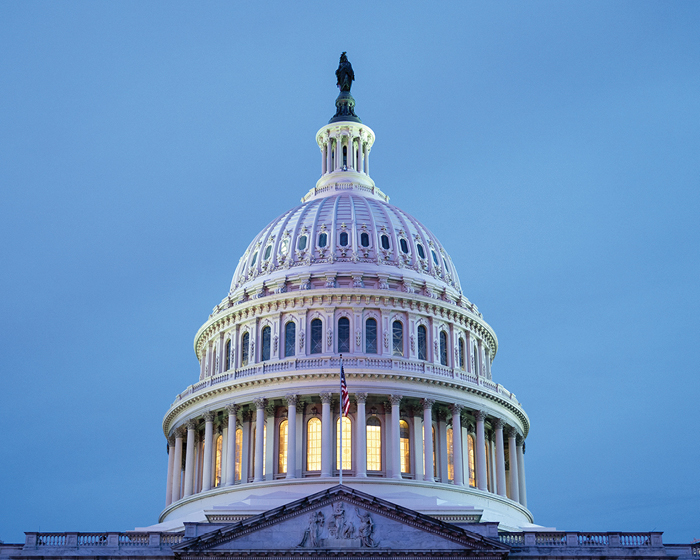Key Takeaways
- As Congress returns, it will have to confront some tax items not addressed in the massive new 2025 tax bill.
- Issues include funding for the IRS, implementation of the July tax bill, and provisions set to expire this year.
- Republicans hope to pass a second tax bill, but it’s unclear if they can capture momentum again.
- Experts raise constitutional concerns about Trump's Nvidia deal.
- Facebook founder Mark Zuckerberg pressed Trump on digital tax response.
Congress is returning to D.C. next week following its August recess. While the next few months likely won’t match the flurry of activity from the first half of the year, there are still many outstanding matters which could affect taxes.
Gov't Funding
The first order of business for Congress will be keeping the lights on. Funding for the federal government runs out on September 30, unless lawmakers can pass an appropriations bill or a continuing resolution. Given the acrimony surrounding the extension of funding in March, it is not expected to be an easy negotiation between parties. One matter on the table will be funding for the Internal Revenue Service, following Republican proposals to enact further cuts to the agency. Just a few years after Democrats put in place new funding for tax enforcement through the Inflation Reduction Act, they may have to decide how much of a roll-back they can stomach.
Year-end Expirations
The One Big Beautiful Bill Act took care of most of the tax credits that had been set to expire at the end of the year. But not quite all. The expanded eligibility for premium tax credits to purchase health care through Affordable Care Act exchanges–often called enhanced premium tax credits–will expire at the end of the year, after being extended from 2021-2025 by the Inflation Reduction Act in 2022. If Congress doesn’t act, the Congressional Budget Office estimates that 5.6 million enrollees will lose coverage due to the change.
The Work Opportunity Tax Credit, a $2,400 credit for businesses to hire individuals from certain disadvantaged groups, is also set to expire at the end of the year. These expirations could force the parties to come to an agreement on the issues, although some conservatives would be willing to let them phase out.
OBBBA Implementation
The Big Beautiful Bill is set for a big rollout—whether it will also be beautiful is likely to be in the eye of the beholder. Even though the bill extends many pre-existing provisions, it still presents complex and difficult challenges for the U.S. Treasury Department. Add to that several new provisions and new restrictions and phaseouts on existing energy tax credits, and the administration will need to answer many outstanding questions as Congress looks on.
Already, there’s been some back-and-forth with key lawmakers on how the department will record when projects using wind and solar credits start, to determine whether they meet timelines the OBBBA imposed. And representatives from the Las Vegas area are pressuring Treasury to be as expansive as possible when devising rules for the new $25,000 deduction on tipped income.
While these questions are ultimately up to the executive branch, Congress has many tools to try to influence these decisions–including open letters, statements in the Congressional record, and even hearings.
A Second Tax Bill
There’s still talk in D.C. about a second larger tax bill this year–whether as part of year-end extensions or as a Republican-only bill passed through reconciliation. There were plenty of items that didn’t make it into the OBBBA, that lawmakers would love to take a second stab at, including a tax cut for pass-through entities.
It still seems like a long shot. But stranger things have happened—some of them this year. What will determine whether this becomes a more serious idea is urgency. Almost everyone in the Republican Party viewed the OBBBA as must-pass legislation, which forced many senators and representatives to swallow many items they’d normally oppose. It’s hard to see a second tax bill—passed under the reconciliation process so Republicans won’t need any Democratic votes—passing unless it gains similar momentum.
Recent Tax Pieces:
What’s Next for the IRS? Another Overhaul? – Doug Sword, Tax Notes ($):
“We actually have lots of language; we’re just trying to find ‘where’s my vehicle?’” Schweikert said, adding that the vehicle for IRS legislation could be the fiscal 2026 omnibus spending bill.
Trump’s Nvidia Deal Is Almost Certainly Unconstitutional — Not That It Matters – Joseph Thorndike, Tax Notes ($):
Not a lot of wiggle room in that blanket prohibition. And the history of the export clause only makes the problem worse. When the Constitutional Convention adopted its ban on export taxes, the founders weren’t playing around. “The Export Clause was intended to be a complete prohibition of export taxation, and the prohibition was intended to have real bite,” explained constitutional tax scholar Erik Jensen in a 2003 article.
The Tax Angle: Tariff Troubles, Tipped Income – Stephen K. Cooper, Law360 Tax Authority ($):
"The increases in tariffs will make consumer goods and capital goods (the physical assets that businesses use to produce goods and services) more expensive, which will reduce the purchasing power of U.S. consumers and businesses," Swagel said. "Those increases in costs will put temporary upward pressure on inflation."
Zuckerberg Pressed Trump on Digital Taxes Before Tariff Vow – Riley Griffin and Jennifer A. Dlouhy, Bloomberg News ($):
Treasury Pushes Shopify-Inspired AI Policy After Trump Order – Erin Schilling and Erin Slowery, Bloomberg Tax ($):
Any requests for hiring or additional resources must include an explanation for why the project can’t be completed through AI-driven solutions.
Make a habit of sustained success.



